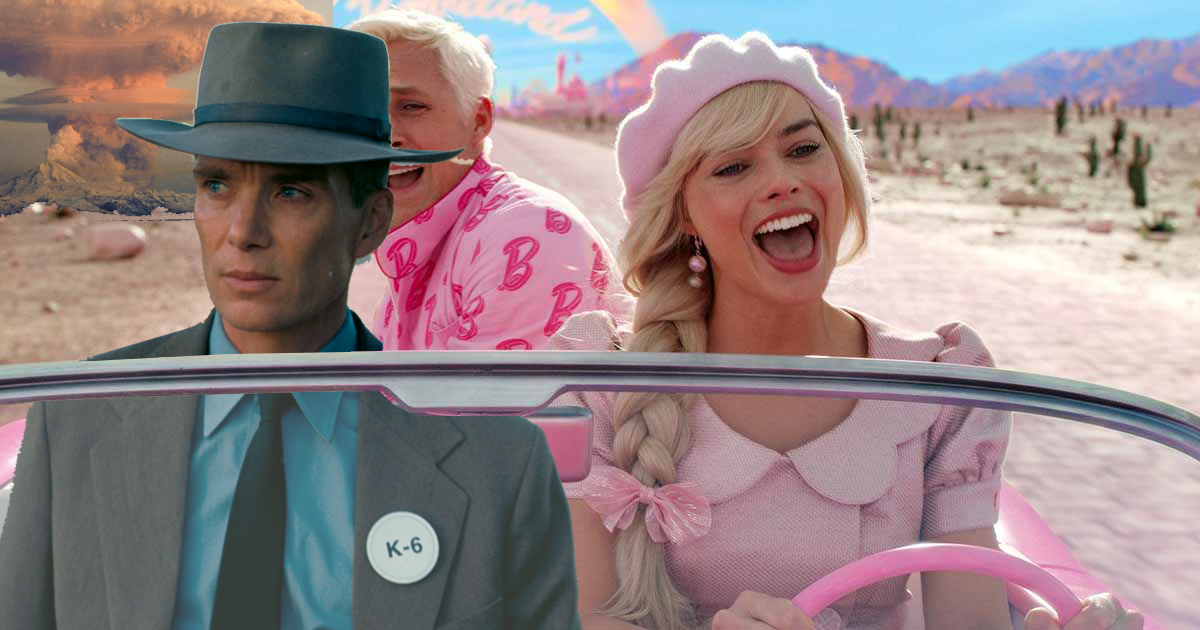
Could “Barbenheimer” be a new start for Hollywood?
It is 1 in the afternoon on Saturday, July 22nd. I am frantically driving to my local neighborhood Regal theater, trying to arrive on time to buy a large popcorn and drink combination and get to my seat comfortably in time for a matinee IMAX showing of Oppenheimer that begins in an hour. Normally, a showing early in the day on the weekend is a safe bet that the theater will be relatively empty and there is no need to book a ticket online over a week in advance. However, as me and my friends scanned our tickets by the usher booth and walked in to see hundreds of Brooklyn locals just as excited as ourselves for what has been appropriately titled “Barbenheimer” weekend, I knew this was no ordinary time at the movies.
Mothers and daughters dressed in pink for Barbie, friends gathered on line discussing how excited they are to see director Christopher Nolan pull off a bomb sequence without using CGI-effects in Oppenheimer, and large groups of people taking pictures by the posters to prove to future generations that they were, in fact, there on opening weekend: Not since pre-pandemic times has the hype surrounding a movie release (or should I say, multiple releases) been so authentically felt among moviegoers.
In the months leading up to the releases of Barbie and Oppenheimer, thousands of memes flooded the internet regarding the double-feature of these two films. One meme format that especially stood out was taking a photo of strong, stereotypically masculine men (such as images from Goodfellas or The Sopranos) and writing a caption under them that would read “tickets to Barbie please.” This initially began in movie-group circles but the closer “Barenheimer” weekend approached, the more difficult it was to avoid this conversation. If any reader managed to miss these memes and does not know what I am referring to, I congratulate you for spending little time online.
Although from the way I describe it, it probably seems that these two films were destined to become smash hits at the box-office, studio executives underestimated the power of word to mouth. Just a week prior to the release of “Barbenheimer,” Paramount Pictures released the seventh film of the Mission: Impossible franchise. After Tom Cruise unofficially saved the movies last year with Top Gun: Maverick, M:I7 was expected to be a massive blockbuster success. Paramount even released the film late into July in order to not compete with Indiana Jones and the Dial of Destiny. However, not only did Indiana Jones underperform with a mixed critical reception, but M:I7 is not doing as well as anticipated, with the largest drop from opening weekend to following weekend in box office numbers for the series.
The surprise financial disappointment of the two latest franchise films touches on a larger phenomenon that seems to be happening in the film industry. Though Oppenheimer is based on one of the largest events in modern history and comes from one of the most established filmmakers today, and Barbie is a story revolving around one of the most popular consumer products of the past century, both of these films stand independently with self-contained stories. There is no cinematic universe tied to Nolan’s film, and there will not be an Einstein sequel to follow. Greta Gerwig’s Barbie, similarly, will not require you to watch a Ken origin story to fully understand what is happening (although that does sound hilarious as I am typing this). I mentioned earlier that this weekend felt like a return to form for the movies, but even before the pandemic, theater showings were dominated with movies that existed within cinematic universes and, even tougher to swallow, remakes. Many of these franchise films are actually great (I still believe Avengers: Endgame to be emotionally powerful beyond its connection to other Marvel movies), although it was beginning to look harder and harder for original properties to break through the cracks and compete against the bigger, more CGI-driven stories.
Sure, in the years since the Covid-19 lockdown, there have been a number of very successful franchise films with already beloved characters and that does not seem to be slowing down anytime soon, save for the strikes. Many of the year’s best films even meet this criteria too (John Wick: Chapter 4, Across the Spider-Verse, and the aforementioned M:I7), and they deserve just as much respect as a good standalone film. However, the critical and financial success of Barbie and Oppenheimer, especially the latter — a three hour WWII drama — could pave the way for more individual stories packing the aisles in Regals and AMCs across the country. The sentiment toward an ever-expanding universe, where movies and shows must coneside for the audience to be completely immersed in what is happening on screen, seems to be getting more critical as the years go on, and these movies feel like a breath of fresh air by comparison.
For those who are fans of larger cinematic universes and are indifferent to who dominates the box office, I argue this: not only is giving audience members more choices with what they see a good thing, but maybe this can serve as a wake up call that these mega franchises need to prioritize quality over quantity. It is hard to argue that the standard of blockbuster filmmaking has not been receding lately, and the box office results of movies like Ant-Man 3, Shazam 2 and, most recently, The Flash are reflective of a demand for more effort and care put into those films. So perhaps a situation like this one, where “Barbenheimer” can bring in over half a billion dollars opening weekend, is a win for everybody. This could pave the way for studios to have more faith in household name filmmakers and their passion projects, while also forcing the big guys to no longer cut corners when it comes to storytelling and effects quality.
Now if you don’t mind, I have to iron my pink suit for a second viewing.

One thought on “Could “Barbenheimer” be a new start for Hollywood?”
Comments are closed.